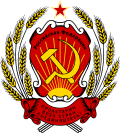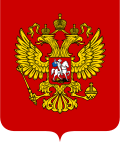History of post-Soviet Russia
Because of the end of the Soviet Union, Russia went through a large change politically, economically, and militarily. First off the Soviet Union became the Russian Federation. People now consider that the Federation is a follow up of the Soviet Union. However, Post-Soviet Russia lacked the military and political power of the former USSR. Now that communism died, Russia could elect a President. In June 1991, Boris Yeltsin was elected as the first president of Russia.
Change in Economy
Boris Yeltsin told his people that he would help the economy. One thing he did was help improve trade with other countries. However, not all his ideas would be good. When Yeltsin lifted price controls, a sudden increase in prices occurred (hyperinflation). Because the military was hit hard during the fall of the Soviet Union, many plants laid off workers because the Government was not sending the plants any new orders. This led to large unemployment.
In August 1998 the Russian government devalued the ruble and defaulted on their debt. This was called the 1998 Russian financial crisis. This was due in part to the Asian financial crisis and the war in Chechnya. Many banks were forced to close down. The government stopped making payment of wages, pensions and when workers were paid, it was often with goods rather than rubles. Despite this, Russia came back from the August 1998 financial crash with speed. This was because the price of oil went up. Having the prices of oil go up, the exportation of the oil form Russia would cost more. This would bring in lots of money for the economy.
A series of privatizations occurred.
Relationships with Countries
Unlike in the Cold war, Russia now said that the West was considered an ally. In June 1998 they joined the NATO peace-keeping forces. The Russians also have begun relationships with China. In 1997 the Russians made a treaty with Belarus.
Today
Russia in the 21st century has gone through many changes. In 2000 Vladimir Putin was made President of Russia. Through his term he had good and bad approval ratings. In 2001-2002 Putin took over several media stations. Issues like this have also occurred with print media. However Putin has done good things for Russia. Real GDP grew on average 6.7% a year, average income increased 11% annually, and a positive balance of the federal budget now let the government to cut 70% of its debt during his term.
History Of Post-Soviet Russia Media
Former Russian national anthem (1990–2000), performed by the Brass Band of the Russian Ministry of Defense
National Anthem of Russia (2000), instrumental, one verse
Russia's GDP by purchasing power parity (PPP) from 1991 to 2019 (in international dollars)
A street flea market in Rostov-on-Don, 1992
Pensioners at a rally as part of the All-Russian trade union action "No to destructive economic reforms" in Pereslavl-Zalessky, October 7, 1998
Russians protest the economic depression caused by the reforms with the banner saying: "Jail the redhead!", 1998.
Burned facade of the White House after the storming







